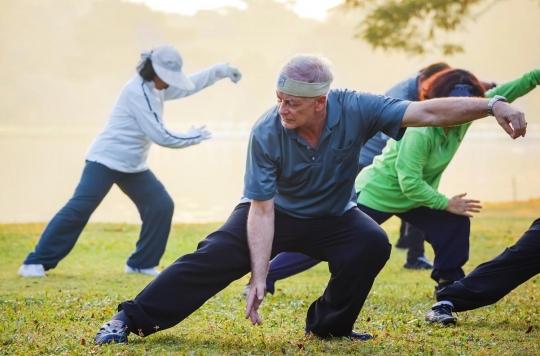After an in-depth study of the health benefits of tai chi, researchers recommend this practice to improve the psychological well-being of people suffering from cardiovascular disorders.

- People with cardiovascular disorders are very often prone to develop depressive symptoms
- Practicing tai chi on a regular basis would improve the psychological health of these patients
- Tai chi can be practiced at any age, seated if the state of health requires it.
tai chi is a Chinese martial art with a spiritual dimension, aiming to work energy (called chi). According to a recent study published in The European Journal of Cardiovascular Nursingpracticing tai chi when you feel depressed, or when you suffer from depression, would soothe the mind. Since depressive symptoms affect approximately 20% of patients with coronary heart disease, 20% of heart failure patients, 27% of hypertensives, and 35% of stroke survivors, researchers thought tai chi might -be the solution.
“If you have had a myocardial infarction, a stroke, or if you have another cardiovascular disease I would strongly recommend that you add tai chi to your treatment or your recoverysaid Dr. Ruth Taylor-Piliae of the University of Arizona, lead author of the study. There are physical benefits like better balance and mental health benefits.”
A reduction in psychological distress
In any case, this is what the researchers observed by analyzing the data from 15 clinical trials conducted on the subject and including 1,853 patients aged 66 on average – 44% of them were women. Tai chi would reduce the symptoms of psychological distress as a whole and reduce those of depression.
While the symptoms of patients with cardiovascular diseases considerably affect their quality of life (shortness of breath, fatigue, etc.), regular practice of tai chi has been shown to help them feel better, make them want to go out and socialize, but also gave them the energy to go for a walk and carry out their daily activities. “I think it’s the synergy between postures and breathing. During tai chi you have good body posture and research has shown it improves mood”analyzes Dr. Ruth Taylor-Piliae.
The researcher points out that it is essential to learn about this practice with a teacher, so as to adopt the correct postures and avoid injury. Nevertheless, tai chi remains a gentle martial art, which can be practiced at any age, by people unaccustomed to physical exercise or suffering from respiratory problems, this discipline can also be practiced sitting on a chair.
The health benefits of tai chi have already been demonstrated
In 2015, a study published in the British Journal of Sports Medicine demonstrated the benefits of tai chi on people with chronic diseases and osteoarthritis. Thanks to these slow movements and deep breathing, tai chi would soothe the pain and stiffness associated with osteoarthritis. Seniors practicing this discipline would have less risk of falling and people with chronic heart and respiratory diseases, including chronic obstructive pulmonary disease (COPD) would also find virtues there.
The researchers found at the time that out of 1,600 people with chronic diseases interviewed in different studies, all reported an improvement in their well-being after 12 weeks of practice, at the rate of two to three weekly sessions. .

.














